Ahead of the first caucuses and primaries of 2020, Joe Biden enjoys a narrow lead as Democrats’ top choice for president. In an open-ended question, 26% of Democratic and Democratic-leaning registered voters volunteer Biden as their top choice for the nomination. Slightly fewer say Bernie Sanders is their first choice (21%), while 16% say they would like Elizabeth Warren to be the nominee. Pete Buttigieg (7%), Michael Bloomberg (5%), Andrew Yang (3%) and Amy Klobuchar (2%) receive support from smaller shares of Democratic voters.
There continue to be notable demographic differences among Democrats in their primary preferences, particularly by age, education, and race and ethnicity. However, there are no significant gender differences in the preferences of Democratic voters.
Sanders is the clear first choice among Democratic voters ages 18 to 29: 40% say he is their first choice for the nomination, compared with 17% who support Warren and just 9% who name Biden. By contrast, a plurality of Democratic voters ages 50 and older name Biden as their first choice for the nomination.
In addition to support among older Democrats, Biden continues to receive strong support from black Democrats. Overall, 36% of black Democrats name Biden as their first choice; far fewer name Sanders (13%) or Warren (9%). The preferences of Latino Democrats are divided: 30% favor Sanders, while 22% back Biden and 11% support Warren.
Among non-Hispanic white voters, there are only modest differences between the shares who support Biden (24%), Sanders (21%) and Warren (19%) for the nomination.
The age differences in candidate support are evident among whites, blacks and Hispanics. For example, while Biden draws the support of just 12% of non-Hispanic white Democrats under the age of 50, a third of whites ages 50 and older support him. Similarly, Biden’s support is greater among blacks and Hispanics ages 50 and older than among those under 50. (See detailed tables for a more granular examination of Democrats’ preferences, including among smaller demographic subgroups).
Warren runs relatively well among Democratic voters who have graduated from college, particularly those with a postgraduate degree. Among postgraduates, 28% say Warren is their first choice for the Democratic nomination; about as many name Biden (25%), while 13% name Sanders and 11% name Buttigieg. Among those with a four-year college degree (but no postgraduate degree), Sanders (23%), Biden (22%) and Warren (20%) all receive similar levels of support. Biden runs better than other Democratic candidates among Democratic voters with no college experience.
Biden receives support for the nomination from a plurality of all Protestants and Catholics. Jewish Democrats also are more likely to name Biden as their first choice for the nomination (31%) than other candidates, including Warren (20%) and Sanders (11%). Among religiously unaffiliated Democratic voters, 28% say Sanders is their first choice for the nomination compared with smaller shares who name Warren (21%) or Biden (17%).
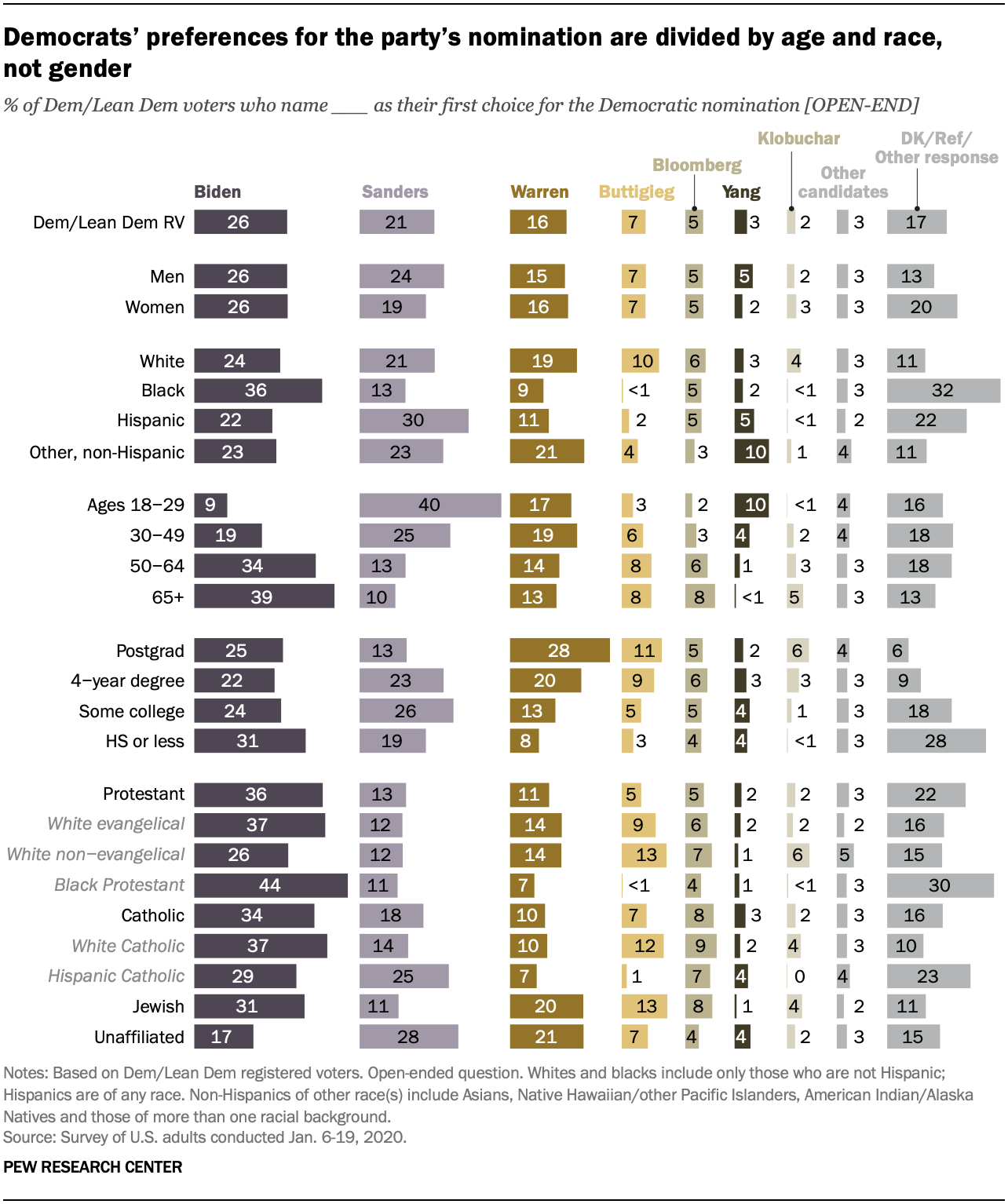
Demographic profiles of Democratic candidates’ supporters
Demographic differences in candidate preferences create distinct coalitions of supporters for the 2020 Democratic candidates. For instance, 74% of Warren supporters and 61% of Sanders supporters describe their political views as liberal, compared with just 37% of Biden supporters.
About a third of Sanders supporters are under the age of 30, compared with 18% of Warren supporters and just 6% of Biden supporters.
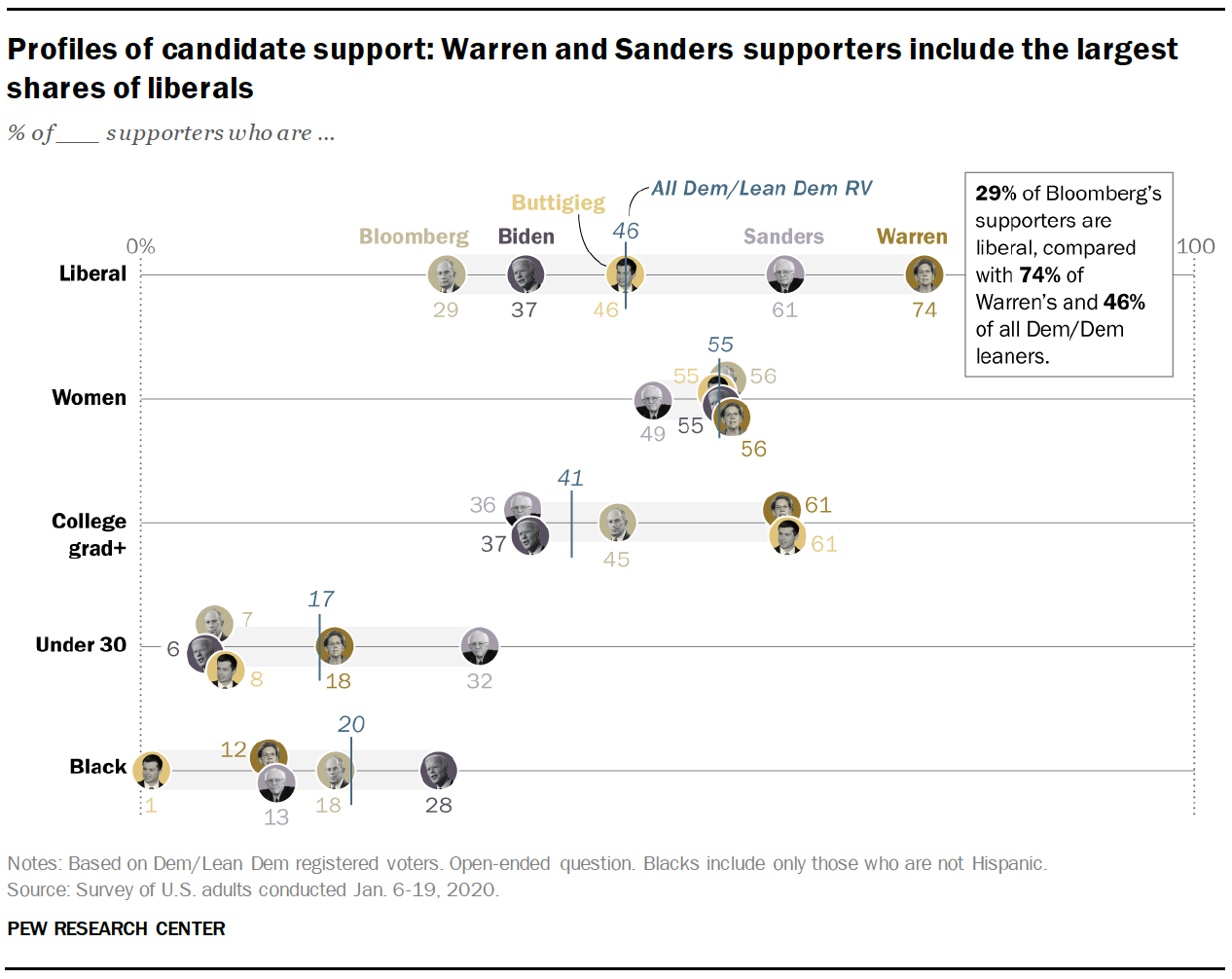
Majorities of Warren and Buttigieg supporters (61% each) have four-year college degrees. Fewer than half of Biden (37%) and Sanders (36%) supporters are college graduates.
Overall, 28% of Biden’s supporters are black Democrats compared with 13% of Sanders supporters, 12% of Warren’s supporters and just 1% of Buttigieg’s supporters.
When asked about their second choice for the nomination, 21% of Biden supporters name Sanders while 15% name Warren. However, a relatively large share of Democratic voters (36%) who support Biden do not volunteer a second choice.
More Sanders supporters (38%) name Warren as their second choice than any other candidate, but 32% give no second option. About a third of Warren supporters name Sanders as their second choice.
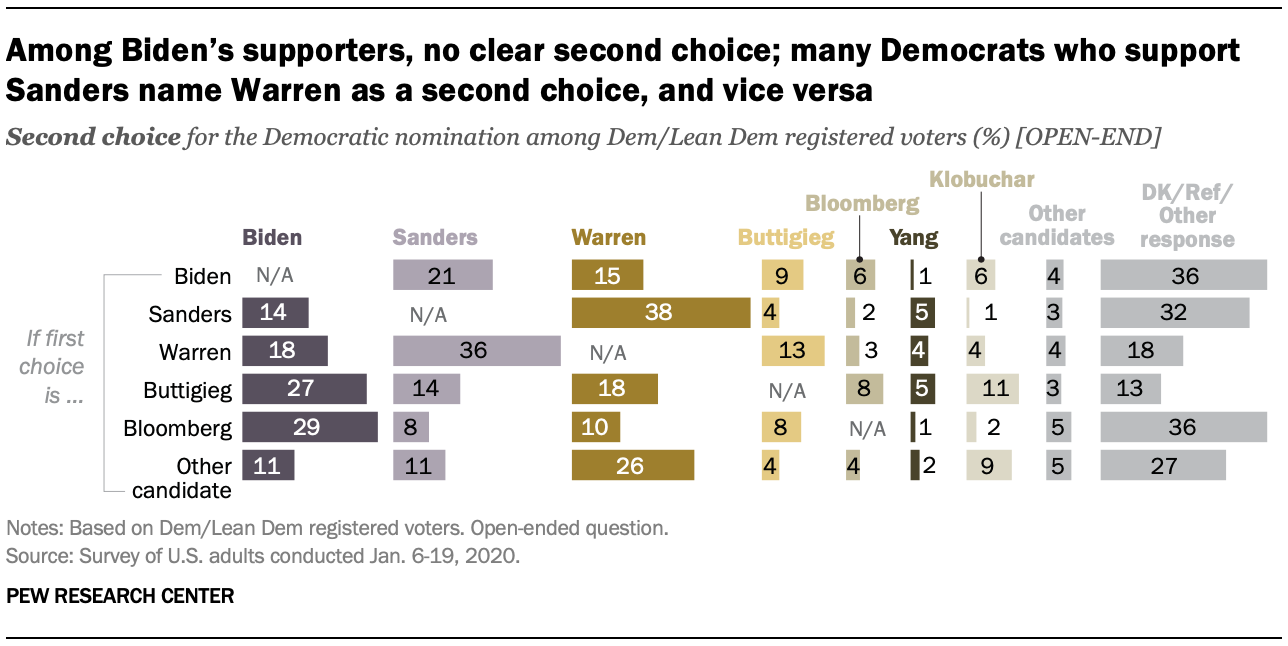
Candidate support among 2016 Democratic primary voters
In 2016, Pew Research Center tracked the preferences of Democratic voters throughout the nomination contest. A relatively large share of Democrats (44%) changed their preferences for the nomination during that contest, while 29% consistently supported Hillary Clinton (naming her as first choice for the nomination in all three surveys conducted between December 2015 and April 2016) and 20% consistently backed Bernie Sanders.
Looking at those same voters today, 43% of Democratic voters who consistently supported Clinton for the nomination in 2016 now support Biden. None of the other Democratic candidates garner more than 13% of this group’s support for the nomination.
Among those who consistently supported Sanders in 2016, 44% favor him for the nomination today, while 25% support Warren.
And among the larger share of Democrats whose preferences were less consistent in late 2015 and early 2016, a third now support Biden, while 17% favor Warren and 13% back Sanders.
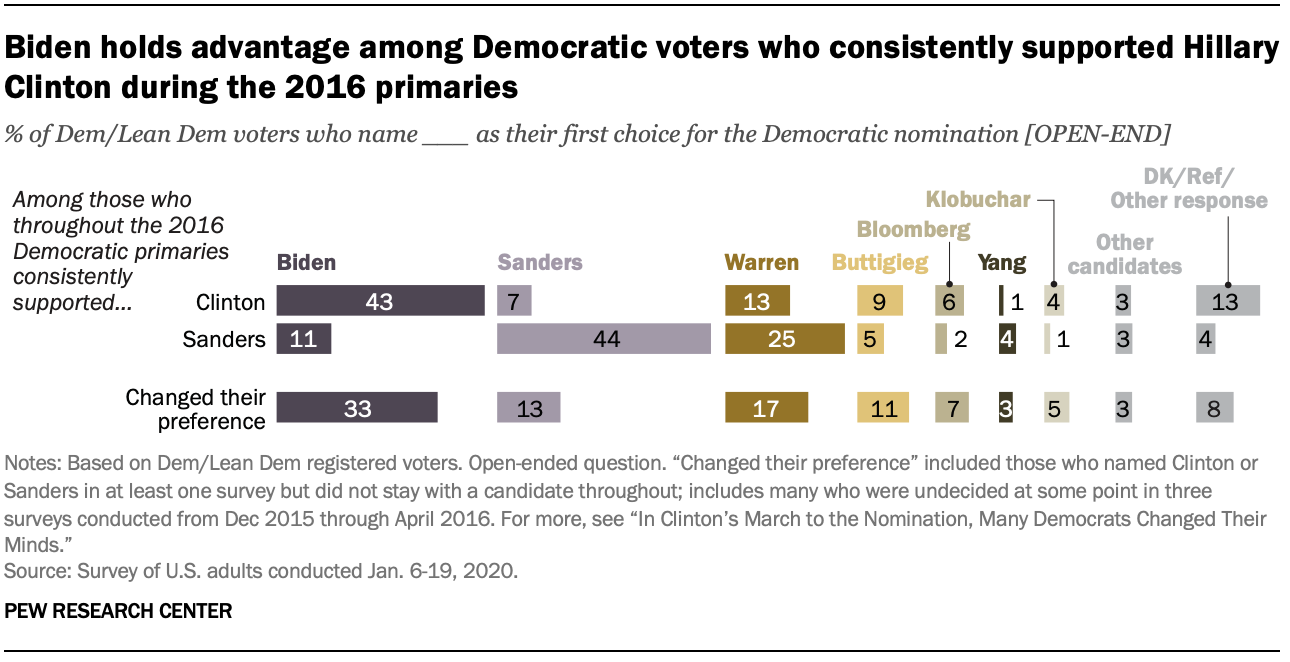
Democrats’ enthusiasm for their first choice and the field
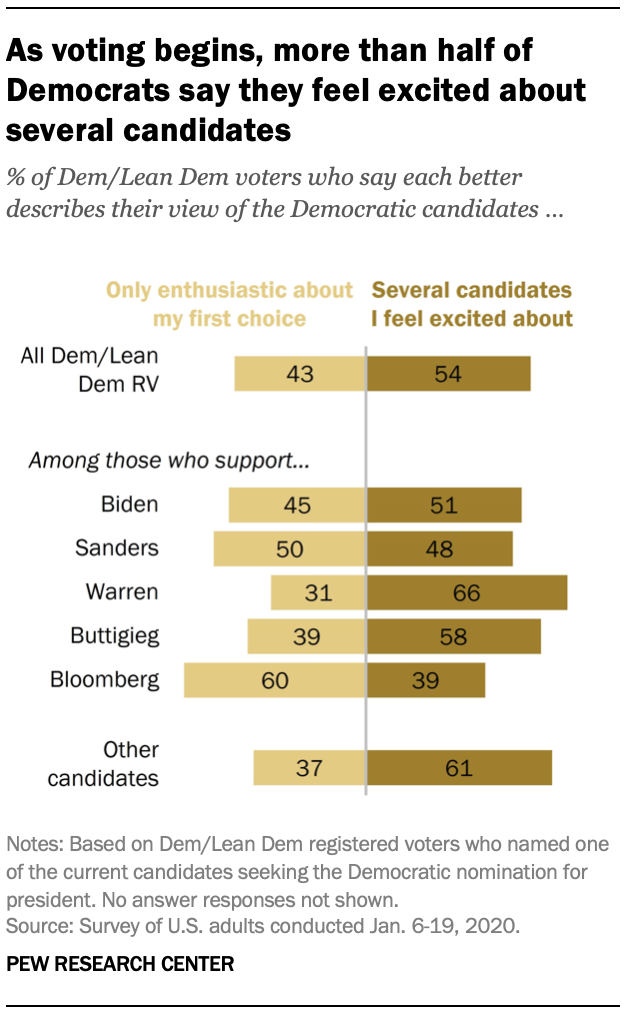
Overall, 54% of Democratic and Democratic-leaning voters who express a preference for a 2020 candidate say there are several candidates running for the nomination they feel enthusiastic about; a somewhat smaller share (43%) say they are only enthusiastic about their first choice.
As the Democratic primary contest has progressed, the share who say they are only enthusiastic about their first choice has increased eight points, from 35% in August 2019.
Views on this question vary by candidate preference. Two-thirds of Warren supporters (66%) say there are several candidates they feel enthusiastic about, 58% of Buttigieg supporters also take this view. Enthusiasm for candidates outside their first choice is somewhat lower among those who say their top choice is Biden (51%), Sanders (48%) or Bloomberg (39%).




